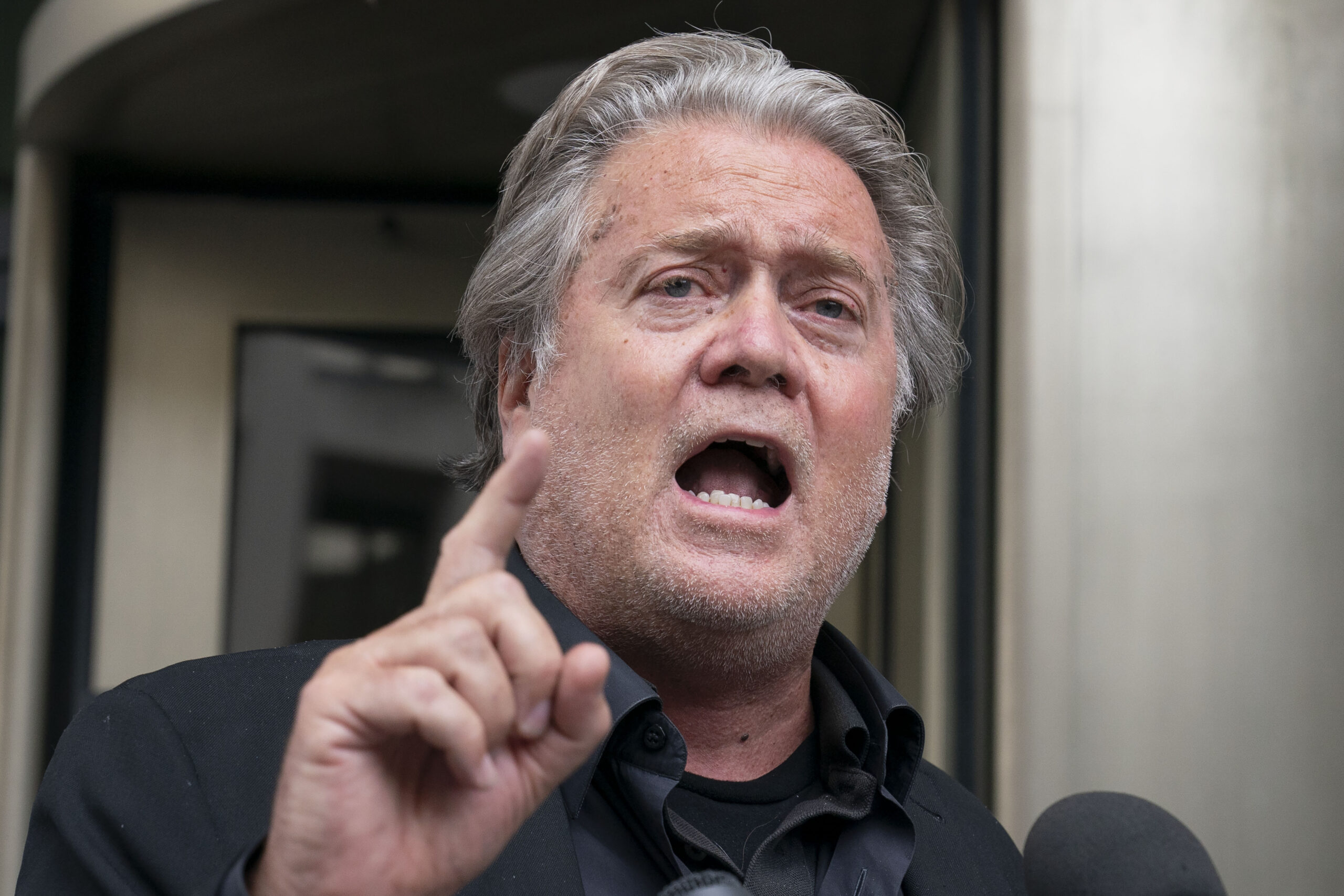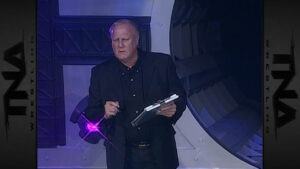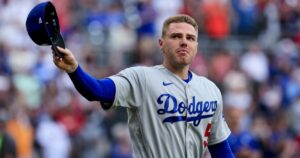Nichols set sentencing for Oct. 21. Bannon, 68, who was free pending trial and remains so as he awaits sentencing, faces up to a total of two years in prison on the two misdemeanor charges.
Outside the courthouse after the verdicts were returned, the former Trump aide and his attorneys indicated they plan to appeal.
“We respect their decision,” Bannon said of the jury and its verdicts. “We may have lost the battle here today, but we’re not going to lose this war.”
“This is round one, that’s what happened. This is a bulletproof appeal,” defense lawyer David Schoen said.
Jury deliberations began just before noon Friday, after prosecutors closed their case with a straightforward assertion that also happened to tie Bannon directly to Trump.
“The defendant,” said Assistant U.S. Attorney Molly Gaston, “chose allegiance to Donald Trump over compliance with the law.”
That contention was part of what Gaston told jurors was a “simple” case about Bannon’s refusal to comply with a subpoena from the Jan. 6 select committee, which unsuccessfully sought his testimony and records last year.
Bannon’s defense leveled a series of brazen, often strained arguments in a bid to win an acquittal or hung jury for their client. Defense lawyer Evan Corcoran even displayed a series of letters in an attempt to convince jurors that Committee Chair Bennie Thompson’s (D-Miss.) signature on the subpoena to Bannon may have been forged.
“You can ask yourself if one of those things is different than the other,” Corcoran said. “That could be a doubt as to the government’s case, a reasonable doubt as to whether Chairman Thompson signed this subpoena. … If you’ve got a doubt in your mind, you’ve got to give Steve Bannon the benefit.”
The House’s select committee had hoped to question Bannon about his prediction on his “War Room: Pandemic” podcast that “all hell is going to break loose” in Washington on Jan. 6, as well as his conversations advising Trump about his effort to remain in power despite losing the election. The committee also recently learned, via Mother Jones, of an audio recording of Bannon days before Election Day, foreshadowing that Trump would declare victory on election night even if he lost and use it as part of a strategy to sow doubt about the integrity of the vote.
The committee also wants to question Bannon about his role in a so-called war room that Trump allies set up at the Willard Hotel in the days before Jan. 6, which became a command center for those strategizing to overturn the election results.
Last week, days before his trial began, Bannon made a belated offer to testify to the select committee, citing an agreement by Trump to “waive” executive privilege over the testimony. The select committee and Justice Department have contended that Trump never claimed privilege over Bannon’s testimony in the first place and that Trump’s ability to do so, as a former president, would have been limited, particularly because the sitting president had affirmatively waived it months earlier. The panel welcomed Bannon’s offer, however, and said it would engage with him if he first submitted documents. The committee also emphasized that his offer didn’t absolve him of his earlier contempt.
After Corcoran referenced those alleged efforts earlier this month to comply, the prosecution seemed to embrace that opening to tie Bannon even more closely to Trump, who is widely unpopular with Washington, D.C., residents.
“How convenient that the former president chose to give the defendant an excuse for his defiance,” prosecutor Amanda Vaughn told jurors. “The defendant stood with Donald Trump and that choice, the deliberate decision to stand with former President Trump, that is a choice — the deliberate decision to defy the subpoena.”
As Bannon’s defense team made their effort to inject doubt into jurors’ minds Friday, Nichols twice intervened to block certain lines of argument after prosecutors objected.
Their other arguments included a claim that the main prosecution witness, Jan. 6 committee chief counsel Kristin Amerling, signed a “proof of service” document related to the subpoena before Bannon’s attorney had actually agreed to accept it.
Corcoran also reiterated claims that Amerling had a questionable relationship with Gaston, who served with her on the committee staff of former Rep. Henry Waxman (D-Calif.) 15 years ago and later joined a book club for Waxman veterans.
“Make no mistake I’m not against book clubs … but why did Ms. Amerling try to downplay her connection to the prosecutor?” the defense attorney asked.
And Corcoran complained that the trial had lasted a week, even though prosecutors only called two witness, though it was the defense team’s voluminous objections and demands for complex legal rulings that largely extended the timeline. In fact, it was Bannon’s team that urged the court to postpone closing arguments until Friday after prosecutors had urged a more expedited schedule a day earlier.
At bottom, Corcoran argued, the case was about politics because Amerling was a longtime Democratic staffer.
“You might ask yourself why did Ms. Amerling want to make an example of Steve Bannon?” the defense lawyer asked. “He has a show, a podcast on political topics and that has a very large following and it’s an election year.”
As the defense wound up its argument, Corcoran leveled a flurry of claims about politics impacting the case and argued that it was part of an effort to “silence the opposition.” Those assertions prompted a series of objections from the prosecution, which Nichols sustained.
“Right now, the president, the Senate, Congress are in the hands of one party, the Democrats,” the defense lawyer said, prompting one sustained objection.
“That’s OK,” Corcoran said.
Prosecutors, anticipating the defense’s claims of political persecution, had preemptively urged the jury to ignore them.
“The only person who is making this case about politics is the defendant,” Gaston said. “There is nothing political about finding out how Jan. 6 happened and making sure that it never happens again.”
Vaughn ridiculed the efforts by the defense to point to issues like the book club the prosecutor and the witness have occasionally attended.
“I don’t know what courtroom Mr. Corcoran was in, but all I learned from that testimony was that Ms. Amerling and Ms. Gaston are book club dropouts,” Vaughn quipped.
Soon after he was charged last fall, Bannon ominously boasted that the case would turn out to be “the misdemeanor from hell” for the Justice Department, Attorney General Merrick Garland and House Speaker Nancy Pelosi. In response to a reporter’s observation that the week-long trial featuring two witnesses, no defense case and verdicts returned in just a few hours did not seem much like hell, Bannon replied: “I thought it was pretty good hell.”
The prosecutors who handled the case declined to comment as they left the courthouse. However, U.S. Attorney for Washington, D.C. Matthew Graves, who oversaw the prosecution, welcomed the jury’s verdicts.
“The subpoena to Stephen Bannon was not an invitation that could be rejected or ignored,” Graves said. “Mr. Bannon had an obligation to appear before the House Select Committee to give testimony and provide documents. His refusal to do so was deliberate and now a jury has found that he must pay the consequences.”
“The tenets of our government rely upon citizens adhering to the established rules of law,” the head of the FBI’s Washington Field office, Steven M. D’Antuono, said in a statement. “Mr. Bannon was found guilty of contempt by a jury of his peers for his choice to ignore a lawful subpoena.”
It’s unclear whether the outcome of Bannon’s trial — which came together after a series of hard-fought and complex legal rulings by Nichols — has any ramifications for another contempt of Congress prosecution against Peter Navarro, a former Trump White House trade adviser who similarly defied a subpoena from the Jan. 6 select committee. Two other committee witnesses, former Trump chief of staff Mark Meadows and longtime Trump aide Dan Scavino, were also held in contempt by the House, but the Justice Department declined to prosecute them.
Jan. 6 Committee Chair Bennie Thompson and Vice Chair Liz Cheney issued a joint statement Friday hailing the verdicts and seeming to continue to urge the Justice Department to keep the pressure on recalcitrant witnesses.
“The conviction of Steve Bannon is a victory for the rule of law and an important affirmation of the Select Committee’s work,” they said. “Just as there must be accountability for all those responsible for the events of January 6th, anyone who obstructs our investigation into these matters should face consequences. No one is above the law.”
White House press secretary Karine Jean-Pierre declined to comment directly on the guilty verdicts for Bannon, but indicated that the House panel deserves assistance.
“I’m not going to comment on that specifically,” she said. “People should obviously cooperate with the committee.”
Bannon’s attorneys said they’d hoped to put on a more robust case for their client, but that Nichols effectively foreclosed that by ruling they could not argue to the jury that Bannon was relying on a lawyer’s advice when he did not attend a scheduled deposition last October and did not turn over any of the documents the House Jan. 6 panel demanded.
Nichols also rejected the defense team’s claims that Bannon’s lack of substantive response to the subpoena was excused by Trump’s assertions that it intruded on matters covered by executive privilege.
The House panel contended that Trump never properly asserted any such privilege and that in any event it would not have justified Bannon’s wholesale defiance by failing to show up for a deposition and completely rebuffing the document request.
Nichols said an appeals court precedent from a similar contempt-of-Congress case decided 61 years ago ruled out the bulk of the defense Bannon’s lawyers said he wanted to present. That left the former White House adviser with only a slender claim to put to the jury: that he didn’t think the deadlines in the subpoena were firm, but rather an invitation to negotiation.
Nichols, a Trump appointee, said on several occasions that in his view the six-decade-old D.C. Circuit ruling was probably incorrect under present legal standards, but that as a trial court judge he was obligated to follow the precedent until and unless it was overturned.
The viability of that precedent is likely to be at the center of Bannon’s appeal and could make its way to the Supreme Court. Bannon is likely to ask Nichols to allow him to remain free while he pursues his appeal, which could take a year or longer.
Despite Nichols’ rulings formally knocking out much of Bannon’s defense, the jury did hear testimony and see exhibits detailing the arguments Bannon lawyer Robert Costello made to the House panel last year that Bannon was actually legally prohibited from complying with the subpoena until Trump’s privilege concerns were resolved by the courts or sorted out with the committee.
Nichols allowed that evidence to show the jury the back-and-forth that may have informed Bannon’s assessment of whether he’d definitively snubbed the committee, but the judge instructed the jury that the validity of the assertion of executive privilege was irrelevant to what they had to consider.
Bannon, a former Goldman Sachs partner and top executive at the right-wing Breitbart website, served as a key adviser to Trump during his 2016 presidential campaign and then joined the White House staff as chief strategist. Trump fired him after about seven months on the job, following a series of run-ins and turf battles with other aides and amid suspicion that he was leaking details about internal deliberations to reporters.
Bannon had been out of his White House post for more than three years by the time of the 2020 election and Trump’s ultimately unsuccessful bid to overturn the results in court, in state legislatures and in Congress. However, he reportedly remained in contact with Trump during that period, serving as an informal adviser.
House committee members said Bannon’s executive privilege claim was frivolous since he was not a White House or top-level official at the time of the Jan. 6-related events. At least one Justice Department legal opinion suggested that the privilege could extend to outside advisers, but no court has ever upheld such a claim.
Matt Berg and Ari Hawkins contributed to this report.


